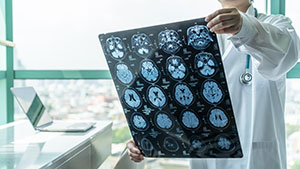August 26, 2020
.jpg.aspx)
As healthcare professionals discover more about how COVID-19 affects the respiratory system, scientists suggest the virus could have potential neurological consequences in some patients.
Baycrest and Sunnybrook researchers have partnered to develop NEUROCOVID19, a national study to investigate how COVID-19 impacts the brain.
“It is critical that we understand the possible effects of COVID-19 on brain health, both to address immediate needs and to prepare for longer term impacts,” says Dr. Sekuler, Vice President of Research at Baycrest and Sandra Rotman Chair at Baycrest’s Rotman Research Institute (RRI).
“We know from early case reports in China that about 30 to 40 percent of hospitalized patients had neurological symptoms,” says Dr. Graham, Interim Director of Physical Sciences at Sunnybrook Research Institute. “Symptoms included headaches, confusion, and stroke. Most common was a loss of smell, which in the absence of any nasal congestion suggests that the virus may affect brain regions that control our sense of smell. Chronic neurological problems have also been associated with other types of coronaviruses, such as SARS and MERS (Middle East Respiratory Syndrome). Given the numbers of people infected by COVID-19, more detailed brain research is definitely needed.”
“COVID-19 can have a big impact on the lungs, but at what point are symptoms a reflection of bottom up versus top down processes in the body? Breathing occurs when signals are sent from the brain down to the body. If some of the COVID symptoms are due to disrupted brain-to-lung signals, then this could be a blind spot in understanding the virus. This needs to be explored,” says Dr. Brad MacIntosh, study co-investigator and senior scientist at Sunnybrook Research Institute. “Our goal is to investigate this further to assess to what extent COVID-19 may impact the brain.”
In this study, the researchers will investigate the neurological impact of COVID-19 through the use of clinical assessments and magnetic resonance imaging (MRI) of the brain in recovered COVID-19 patients. Patients who have tested negative are also invited to participate in the study, acting as a control group. Study participants will be assessed at baseline and several months after their initial visit, to detect whether brain symptoms are present, and whether the symptoms resolve or linger. The research team aims to enlist several more imaging sites across the country to increase the number and diversity of the participants who are studied.
“This collaborative effort is paramount in the discovery of how COVID-19 could potentially impact different regions of the brain and what effect the virus may have on thinking, learning and memory,” says Dr. Jean Chen, senior scientist at Baycrest’s Rotman Research Institute and co-principal investigator. Other Baycrest co-PIs include Dr. Asaf Gilboa and Dr. Allison Sekuler.
Adds Dr. Sekuler, “We are thrilled to be co-leading this study, and to be working with scientists from across the country to get answers as quickly as possible.”
“In addition to raising awareness of this issue among doctors and in the public,” says Dr. Graham, “the study will also allow us to direct patients in need towards neurointerventions and treatments as early as possible.”
About Baycrest
Baycrest is a global leader in geriatric residential living, healthcare, research, innovation and education, with a special focus on brain health and aging. Baycrest is home to a robust research and innovation network, including one of the world’s top research institutes in cognitive neuroscience, the Rotman Research Institute; the scientific headquarters of the Canadian Consortium on Neurodegeneration in Aging, Canada’s largest national dementia research initiative; and the Baycrest-powered Centre for Aging + Brain Health Innovation, a solution accelerator focused on driving innovation in the aging and brain health sector. Fully affiliated with the University of Toronto, Baycrest provides excellent care for older adults combined with an extensive clinical training program for the next generation of healthcare professionals. Through these initiatives, Baycrest has remained at the forefront of the fight to defeat dementia as our organization works to create a world where every older adult enjoys a life of purpose, inspiration and fulfilment. Founded in 1918 as the Toronto Jewish Old Folks Home, Baycrest continues to embrace the long-standing tradition of all great Jewish healthcare institutions to improve the well-being of people in their local communities and around the globe. For more information please visit:
www.baycrest.org
About Baycrest’s Rotman Research Institute
The Rotman Research Institute at Baycrest is a premier international centre for the study of human brain function. Through generous support from private donors and funding agencies, the institute is helping to illuminate the causes of cognitive decline in seniors, identify promising approaches to treatment and lifestyle practices that will protect brain health longer in the lifespan.